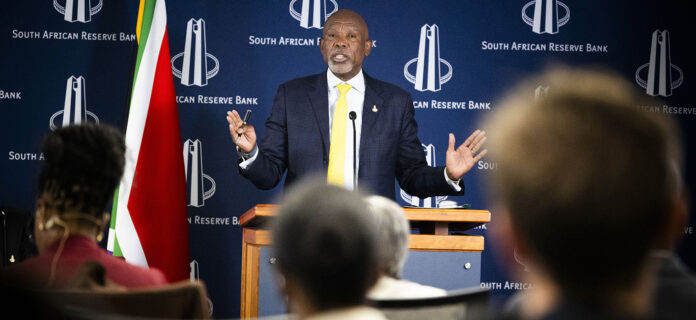South African Reserve Bank (SARB) governor Lesetja Kganyago has allayed fears regarding the negative consequences of US President Donald Trump’s 30% reciprocal import tariffs on South African goods.
Kganyago said though “the US was a large trading partner for South Africa, it is not as important as Europe, China or the Southern African Development Community”.
The governor said this after Trump’s tariffs kicked in on Thursday.
“Our exports to the US mostly consist of commodities, some of which are exempted, and manufactured products such as cars. Some parts of the agricultural sector are exposed, but total agricultural exports are only about 3% of our total exports to the US,” said Kganyago while delivering a speech at the 105th annual ordinary general meeting of SARB shareholders.
Last month, Kganyago told a commercial radio station that Trump’s tariffs could result in about 100 000 job losses. This week, the Department of Trade, Industry and Competition said up to 30 000 jobs could be lost.
On Friday, Kganyago stated that “in other regions, it has been clearer that trade disruptions are not causing significant inflationary pressure”.
Since the majority of other countries, he said, have adopted a stance not to raise their tariffs in response to US actions, the primary worry has been that supply chain disruptions would result in price increases.
“As the year has developed, what we have seen is mostly modest disinflationary effects, stemming from weaker demand and excess capacity.”
Kganyago said a weaker dollar has also been supportive of other countries, especially emerging markets.
“This has given many central banks the scope to ease policy rates and adopt more neutral policy stances,” he said.
“In South Africa, our preliminary assessment is that tariffs and the other uncertainties in the global economy are causing modest damage to growth while leaving inflation broadly unchanged.
Economist Mandla Maleka, however, held a different view, warning that Trump’s 30% reciprocal tariffs would result in trade wars.
“Invariably, countries outside the US are going to begin to have tariffs.
“Whatever we are exporting to China, Russia and India, and so forth, and whatever we are importing from those countries, we are going to begin to have trade wars that are not started by us but by the US,” said Maleka.
“But because we are trying to respond and secure our own market, we are going to have trade wars.
“If the citrus fruit doesn’t move as much as we want it to in the US, and we want to go and dump it in India because they have a big market, they are going to force us to lower our prices because India is not as rich as America. So that’s now an international trade war,” explained Maleka.
Black Business Council deputy president Gregory Mofokeng said the council was convinced that the country needs to look elsewhere and diversify its export market.
“An overreliance on one market has clearly proven to be a disadvantage for us. The concerns from our members are that their revenue is going to be hit, and this will lead to profitability loss, meaning the businesses are going to get into trouble,” said Mofokeng.
He emphasised that it was vital for the state to assist in keeping those companies afloat in the interim so that when new markets are found, they will be in a position to exploit them.
Mofokeng advised the government to consider increasing the level of trade with the European and Asian markets.



